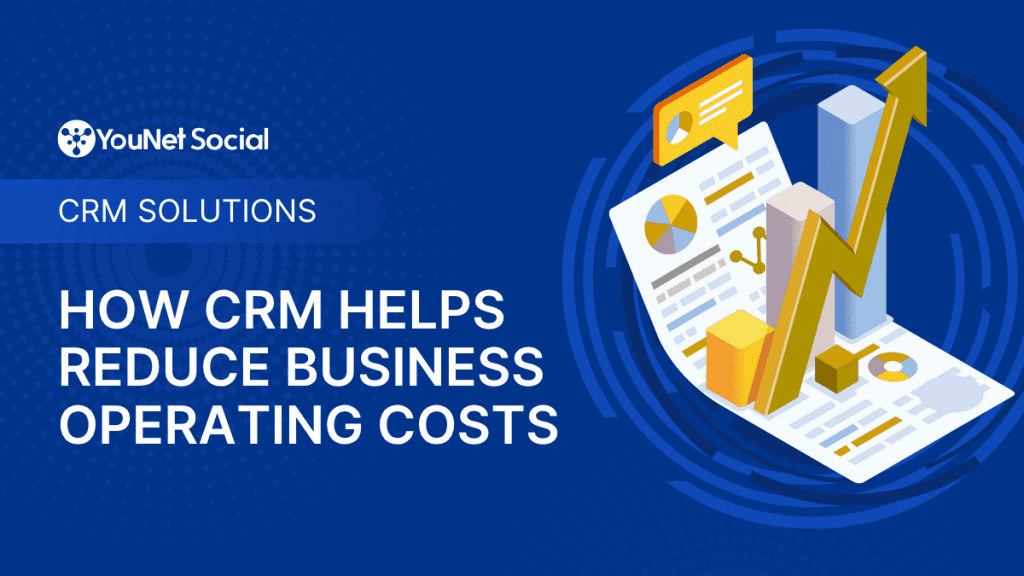

Running a business can get expensive, especially when things aren’t running smoothly behind the scenes. Maybe your sales team isn’t on the same page, or your customer info is all over the place. As a result, you spend more money hiring people to fix these problems, but somehow, the results still fall short.
Here’s the good news: there’s a smarter way to manage everything—and it starts with CRM.
A CRM (Customer Relationship Management) system helps you organize your business in one place. It keeps track of your customers, sales, marketing, and even team activities. More importantly, it helps you cut down on wasted time and costs—sometimes by as much as 80%.
In this blog, we’ll show you how using a CRM can help your business work better, save money, and grow faster—without the headache.
Why Is CRM So Important for Your Business?
Think of CRM as your business’s central command center. It helps you see both the little details and the big picture—so you can make smarter decisions, whether you’re planning for next week or next year.
When used correctly, the right CRM can help cut operating costs by up to 80% and boost your sales at the same time. That means fewer manual tasks, less wasted time, and more room to focus on what really matters—growing your business.
No matter your industry or company size, CRM is an all-in-one solution that keeps you connected with customers, improves teamwork, and makes your business run more smoothly and profitably.
Key Benefits CRM Brings to Your Business


A good CRM system does much more than just store contacts. It helps you run your business smarter and smoother. Here are some of the major benefits you can expect:
- Real-time business reports – Instantly see how your business is performing with live dashboards and stats.
- Plan smarter – Organize short-term tasks and long-term goals for every team.
- Track every customer interaction – Keep a detailed history of customer conversations so you never lose context.
- Sync and streamline team workflows – Share info easily between departments and reduce duplication.
- Run remarketing email campaigns – Create, send, and track email campaigns that bring customers back.
- Forecast trends and improve service – Use data to spot patterns, improve customer care, and make better decisions.
- Monitor progress and grow your team – Track task completion and identify training needs to upskill your staff.
How CRM Helps Reduce Business Operating Costs
The core benefits that CRM brings are valuable across all departments in a company. That’s why over 70% of businesses worldwide have adopted CRM into their daily operations.
Below are some of the key areas where CRM helps control and reduce operational costs:
For Sales
CRM is the best friend of any sales team. It allows managers to plan and set goals in advance, with automatic reminders and notifications. Sales history can be reviewed, future revenue can be forecasted, and strategies for upselling or cross-selling can be developed. When integrated properly, CRM helps the sales department perform more effectively.
Reports generated by CRM show past sales data and highlight the reasons for success, helping teams reach upcoming targets more efficiently.
Since CRM stores and processes customer information, businesses can tap into this data to consistently build a loyal customer base and attract new leads. CRM also allows for seamless integration between sales and supply chain management.
With CRM, sales reps can clearly see their daily, monthly, or quarterly targets, which helps them stay on track and motivated. It also enables them to better understand customer behavior, making the sales process smoother and increasing conversion rates.
Customer Service
A CRM system can make customer service extremely simple by recording detailed information, including customer preferences and complaints. CRM can automate the process of handling issues, empowering customer service staff with the tools to manage a wide range of customer inquiries.
Call logs provide valuable insights for the support team—just a click allows them to view the entire customer history without manually searching through records.
This reduces conflicts when resolving customer issues and cuts resolution time from days or weeks down to just minutes.
Track Customer Interaction
One of the biggest strengths of a CRM system is its ability to track every interaction your business has with customers, whether it’s emails, phone calls, meetings, or support requests. By keeping all this information in one place, your team can see the full history of customer communications at a glance.
This means no more digging through emails or relying on memory—everyone stays informed, and customer interactions become more personalized and effective. It also helps identify potential issues early, follow up promptly, and build stronger relationships by understanding each customer’s unique journey.
With detailed logs and notes on every touchpoint, your business delivers consistent and attentive service that keeps customers coming back.
Reduce Costs with Efficient Project Management
CRM systems often include tools that help manage projects and tasks across teams, reducing costly delays and miscommunications. By centralizing project timelines, responsibilities, and progress updates, everyone stays on the same page—no more duplicated efforts or missed deadlines.
This streamlined approach saves time and resources by boosting team productivity and ensuring projects move forward smoothly. With clear visibility into ongoing tasks and automated reminders, businesses can avoid costly bottlenecks and allocate resources more effectively, ultimately lowering operational costs.
In short, CRM-powered project management keeps your business organized and efficient, cutting unnecessary expenses while driving better results.
Conclusion
Through the insights above, you have explored the benefits and ways CRM helps businesses reduce operational costs. Investing in CRM software allows businesses to reduce costs and save time by eliminating unnecessary software or tools that lack flexibility to work across multiple departments. However, not every technology delivers such efficiency—be sure to choose the right CRM that fits your company’s size and needs to achieve the best results.
For detailed and tailored advice on CRM and how to implement the software effectively, you can contact us for further consultant.



